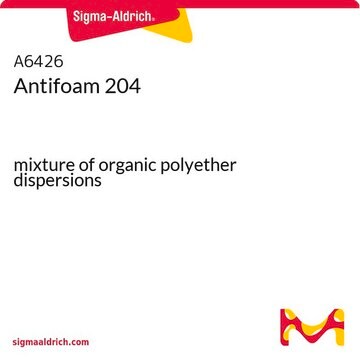W279706
Octanal
≥95%, FCC, FG
Synonyme(s) :
Aldehyde C8, Caprylic aldehyde, Octyl aldehyde
About This Item
Produits recommandés
Source biologique
synthetic
Niveau de qualité
Qualité
FG
Fragrance grade
Halal
Kosher
Agence
follows IFRA guidelines
meets purity specifications of JECFA
Conformité réglementaire
EU Regulation 1223/2009
EU Regulation 1334/2008 & 178/2002
FCC
FDA 21 CFR 172.515
Pression de vapeur
2 mmHg ( 20 °C)
850 mmHg ( 25 °C)
850 mmHg ( 25 °C)
Pureté
≥95%
Indice de réfraction
n20/D 1.421 (lit.)
Point d'ébullition
171 °C (lit.)
Pf
12-15 °C (lit.)
Densité
0.82 g/mL at 25 °C (lit.)
Application(s)
flavors and fragrances
Documentation
see Safety & Documentation for available documents
Allergène alimentaire
no known allergens
Allergène de parfum
no known allergens
Propriétés organoleptiques
fatty; green; orange; waxy; citrus
Chaîne SMILES
[H]C(=O)CCCCCCC
InChI
1S/C8H16O/c1-2-3-4-5-6-7-8-9/h8H,2-7H2,1H3
Clé InChI
NUJGJRNETVAIRJ-UHFFFAOYSA-N
Vous recherchez des produits similaires ? Visite Guide de comparaison des produits
Catégories apparentées
Mention d'avertissement
Warning
Mentions de danger
Conseils de prudence
Classification des risques
Aquatic Chronic 3 - Eye Irrit. 2 - Flam. Liq. 3 - Skin Irrit. 2
Code de la classe de stockage
3 - Flammable liquids
Classe de danger pour l'eau (WGK)
WGK 2
Point d'éclair (°F)
125.6 °F - closed cup
Point d'éclair (°C)
52 °C - closed cup
Équipement de protection individuelle
Eyeshields, Faceshields, Gloves, type ABEK (EN14387) respirator filter
Faites votre choix parmi les versions les plus récentes :
Déjà en possession de ce produit ?
Retrouvez la documentation relative aux produits que vous avez récemment achetés dans la Bibliothèque de documents.
Les clients ont également consulté
Notre équipe de scientifiques dispose d'une expérience dans tous les secteurs de la recherche, notamment en sciences de la vie, science des matériaux, synthèse chimique, chromatographie, analyse et dans de nombreux autres domaines..
Contacter notre Service technique














